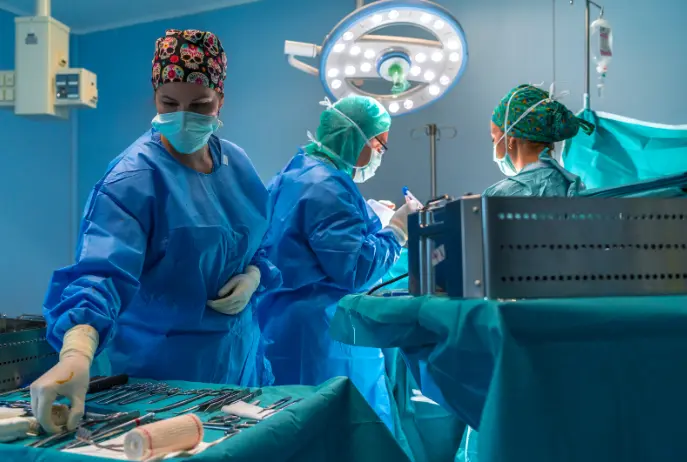Surgical techs are an integral part of any hospital. Their hands-on experience allows them to perform basic surgical procedures, and they make sure that operating room equipment is in good working condition.
As surgical technologists gain experience, their roles expand and they become certified to work on advanced surgical equipment such as robots, da Vinci surgical systems, and cranioscopes. In fact, surgical technologists are even required to work on patients recovering from an aneurysm or other major surgeries.
However, if you’re thinking about how to become a surgical technologist, there’s a lot of groundwork that needs to be done first. This blog will cover all the necessary steps you need to take before taking certification tests. We’ll also tell you whether it is worth it or not and whether certification organizations are demanding of certification holders. Let’s get right into it!
What is a Surgical Technologist?
A surgical technologist is a healthcare professional who works alongside and assists surgeons, nurses, and other members of the healthcare team during surgical operations.
They are responsible for ensuring an organized environment for the procedure, preparing the operating room and taking an active role in the procedure, sometimes even serving as an extra set of hands for the surgeon.
Surgical technicians help with tasks before, during, and after surgeries to ensure safe, sterile procedures for patients. They are responsible for assisting with various surgical tasks such as assisting with patient preparation, monitoring vital signs, assisting with surgical instruments and disposing of surgical waste.
Surgical Technologist Schooling & Certification
Certification requirements vary by state, but typically surgical technologists must earn an associate’s degree or certificate from an accredited program or college. They must also pass a certification exam, which may be offered by the American Registry of Surgical Technologists (ARST) or a similar organization.
Most programs require clinical experience, and some schools offer courses in operating room technology. Certification can open the door to higher salaries and better job prospects. However, to become a surgical tech, you’ll need a degree or certificate, experience, and plenty of motivation to get started.
How to Become a Surgical Technologist?

Here is a step-by-step guideline on how to become a surgical tech:
1. Enroll in a Surgical Technology Degree Program
Surgical technology is a rapidly growing field that requires surgical technologists with a high level of skill and expertise. To be successful in this field, you will need to have a degree in health care or a related field as well as an anatomy and physiology course.
In addition, surgical technologists must have an understanding of anatomy and physiology, medical terminology, and microbiology. If you are interested in pursuing surgical technology as a career, it is important to do your research and find the school that best fits your needs.
2. Earn The Associate’s Degree in Surgical Technology
Surgical technologists typically have an associate’s degree in surgical technology or another related field and are trained to operate various surgical equipment, including robotic systems and high-tech imaging devices. Their training programs are designed to provide students with the skills and knowledge required to become surgical technologists.
Such programs typically consist of classroom instruction, hands-on training, internship or work shadowing opportunities, and a certification exam.
The certification exam associated with surgical technology is offered by national organizations such as the American Society of Anesthesiologists (ASA) and the National Operating Room Council (NOC). It tests basic operating room procedure proficiency and other skills required of surgical technologists.
3. Get Certified By One of the Major Credentialing Organizations
To be certified, surgical technologists must pass certification exams and complete additional requirements, such as education and experience. In some states, surgical technologists are required to be certified. However, employers anywhere may prefer certified surgical technologists.
In addition to certification from a credentialing organization, CPR certification is also required for many positions working in a healthcare setting. Surgical technologists who are certified through a credentialing organization offer greater job security and potential for advancement in their field of work.
The National Board of Surgical Technology and Surgical Assisting (NBSTSA) offers certification programs to become a surgical technologist.
4. Earn CPR or BLS Certifications

Surgical technologists must complete a training program and may need to be certified in some states. The most common certification is the Certified Surgical Technologist (CST) offered by the National Board of Surgical Technology and Surgical Assisting (NBSTSA).
To qualify for the CST examination applicants must be a graduate of an accredited surgical technologist program, surgical first assisting program, or a military training program. Earning CPR or BLS certifications can help applicants stand out and demonstrate knowledge of healthcare. These certifications can also enhance their chances of getting hired as surgical assistants or technologists.
Pros and Cons of Being a Surgical Technologist
Pros
- Surgical Technologists are in Demand: Most surgical technologists work in operating rooms and delivery rooms of hospitals, with some also working in outpatient surgery centers, physician offices, and dental clinics. They are in high demand in the U.S. with projected job growth of 9% from 2020-2030, matching the national average for all occupations.
- The Salary is Good: Surgical technologists typically earn a median salary of $50,000 as of May 2020, according to the Bureau of Labor Statistics. The top 10% of surgical technologists can earn more than $73,000 annually. This high salary is due in part to the high level of education and training required for this profession.
Surgical technologists have the potential to earn in excess of $5,000 per week traveling between different operating rooms assisting with various surgeries. Thus, they have an excellent opportunity for high-level professional growth and advancement.
- Little Education is Required: Education requirements vary by state but generally, the education required to become a surgical technologist is very little. They must have a high school diploma or equivalent and must be certified to operate surgical technology.
To become a surgical technologist, you must have certification or education that qualifies you to operate surgical technology. Thus, it is important to do your research before deciding on a program of study. Several organizations offer certification programs that can help you gain the education and experience required to pursue this career of interest.
- You Have a Hand in Treating Patients: Other than preparing the operating room, surgical technologists also play an important role in preparing the surgical team before a procedure begins. They observe patients’ vital signs, check charts, and assist the surgical team by passing instruments and other sterile supplies to them.
After surgery, surgical technologists stay involved with patient care by assisting with wound care, recovery room care, or discharge planning. Surgical technologists help ensure that high-quality patient care is delivered every time surgery is performed.
- Many Advancement Opportunities: Surgical technologists have many career advancement opportunities, such as registered nurse, postsecondary teachers of health specialties, anesthesia technician, surgical first assistant, physician assistant, physician, and more.
The BLS estimates that surgical tech job openings in the US will swell 7 percent from 2019 to 2029, with an estimated 7,600 new positions created by 2029. With so many options available for surgical technologists to pursue their education and career goals, there is no limit to what they can achieve.
- Able to choose from many options for certification: In order to become certified, surgical technologists typically need a certificate or an associate’s degree in surgical technology. Some states require the certification of surgical technologist workers.
Other certification options may exist; it all depends on the organization that is offering the certification exam and the requirements of the particular state. Overall, surgical technologist certification shows employers that you have the necessary skills and competencies to safely perform in this high-stakes field.
Cons
- Physically Demanding Job: Surgical technologists are typically responsible for preparing surgical instruments and assisting with surgical operations. They wear sterile scrubs and gloves to protect against infection. They must also stand for long periods of time and remain alert during surgical procedures. Working conditions can be physically demanding due to the use of surgical lights, high-tech equipment, and tight spaces.
- An Extreme Level of Detail is Required: Surgical technologists must be detail-oriented as small errors could potentially endanger patients. They must be able to work quickly and efficiently to maintain a sterile operating room. This can be especially challenging when operating on anesthetized or paralyzed patients. Additionally, they may be required to handle surgical tools such as scalpels and saws with precision and accuracy, as failure to do so may lead to serious consequences.

- You Might Have to Be On Call: In some cases, surgical technologists may be called upon to perform other technical tasks such as assisting with patient care or dressing changes after surgery. After surgical operations are completed, surgical technologists may be required to remain on-site for post-operative care or to assist with the recovery process.
- High-Stress Job: Surgical technologists are required to wear protective clothing such as scrubs, caps, masks, and gowns to protect them and the patient from potentially contagious diseases. They also help with surgical procedures by assisting with the sterile preparation of surgical instruments, monitoring patient vital signs and patient status during the surgery, and assisting with a post-operative recovery process.
Overall, surgical technologists have a high-stress job that requires them to be skilled in their field of expertise while maintaining high standards of patient care.
Conclusion
The first step in figuring out how to become a surgical tech is to decide if you’re interested in helping with operations, using technology, and giving excellent care. As a surgical technologist, your responsibilities will include getting everything ready for use, helping physicians and technicians during surgeries, and preparing surgical instruments and equipment.
You may enroll in certification programs offered by a variety of credentialing organizations to improve your chances of landing an entry-level surgical tech career. You may follow your desired career as a surgical technician with commitment and effort.
FAQs
What does a surgical technologist do?
The surgical technologist is responsible for preparing the operating room and ensuring that all necessary equipment and supplies are sterilized and in place for the surgical procedure. During the surgery, the surgical technologist assists the surgeon by handing them instruments and supplies, holding tissues and organs in place, and operating equipment such as suction machines and retractors.
They also monitor the patient’s vital signs and ensure that the operating room remains sterile throughout the procedure. After the surgery is completed, the surgical technologist helps transfer the patient to the recovery room and then cleans and sterilizes the operating room for the next patient.
Is surgical technologist a good career?
Some potential benefits of a career in surgical technology include:
Strong demand for skilled professionals: With an aging population and an increase in chronic health conditions, the demand for surgical procedures is expected to continue growing, creating a need for skilled surgical technologists.
Competitive salaries and benefits: Surgical technologists can earn competitive salaries and benefits, and may have opportunities for advancement into management or leadership roles.
Variety of work settings: Surgical technologists may work in hospitals, clinics, outpatient centers, and other healthcare settings, offering a variety of work environments and opportunities to specialize in different areas of surgery.
Is surgical technology in demand?
Yes, surgical technology is in demand in the healthcare industry. According to the Bureau of Labor Statistics, employment of surgical technologists is projected to grow 7 percent from 2019 to 2029, faster than the average for all occupations. Therefore, if you are interested in pursuing a career in healthcare, becoming a surgical technologist is a promising option.

Leave a Reply